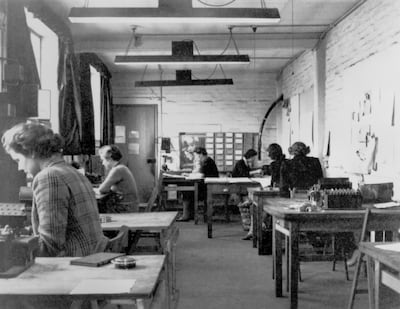As a child in the UK, you’re brought up to know landmarks from the country’s past.
At school, you’re taught about kings and queens and glorious military campaigns. You’re told about rebellions and the creation of Parliament, the arts and literature, of Empire and the Industrial Revolution. Always, there are world firsts.
None more so than in engineering and the sciences. Here, the teaching is of steam engines and trains and apples falling on heads and the Enigma code machine, which foretold the computer, and the internet. And how in medicine, Alexander Fleming discovered penicillin and the DNA double helix was down to James Watson and Francis Crick.
It’s not only schoolteachers who draw on previous achievements. Soon after the 70th anniversary of Crick and Watson’s revelation, British Prime Minister Rishi Sunak launched a plan to turn the UK into a scientific “superpower”, proclaiming that science and innovation “have been in our DNA for decades”.
Similarly, he trumpeted the global AI Safety Summit at Bletchley Park, where the codebreakers led by Alan Turing penetrated Germany’s secret communications. Equally, he promotes life sciences as another modern UK success story.
Yet, just as Britain does not lead the world in AI, contrary to the rosy-hued image painted by the Prime Minister, neither is it any longer in the vanguard of drugs and medicines.
That will not prevent Mr Sunak and his colleagues from stating it is; from never missing an opportunity to don a lab coat and be filmed while extolling Britain’s achievement in leaving other countries trailing.
It’s a well-worn ritual. You cling to history as supplying authenticity and credibility, and enabling the making of all sorts of outlandish claims that do not stand up to scrutiny. Mr Sunak does it; Boris Johnson was a master at it – boosterism really was in his personal DNA.
Britain may be a world-beater in their eyes and those of their unquestioning supporters, but increasingly, not in anybody else’s.
Take the investment decision of Novo Nordisk, producer of the weight loss Wegovy wonder treatment, and as a result, Europe’s most valuable public company, richer than the French luxury combine LVMH.
Its Danish bosses are looking for a location for desperately needed European extra manufacturing capacity. Where do they select? Not the UK but Ireland.
That’s right. The relatively tiny country with no great pedigree to boast about has trumped its larger, noisy neighbour by landing a €2 billion ($2.15 billion) project for the building of an almost 150,000 square-metre factory near Dublin to make medicine for diabetes, obesity and rare diseases.
The plant is at Grange Castle Business park in Clondalkin, already a site for the US’s Pfizer and Takeda, the Japanese acquirer of British firm Shire for £45 million.
Novo’s aim, provided planning permission is forthcoming, is for its facility to be up and running by 2026, creating 1,100 permanent jobs.
It’s another coup for Ireland and another blow for Britain which, make no mistake, would dearly have loved to be pointing to the all-conquering Novo alighting on its shores as a sign of supreme confidence in the country and future prospects.

Novo becomes the latest pharma giant to choose Ireland, propelling it to the top of the charts, along with Germany and Belgium, as a leading drugs producer.
From a virtual standing start, in just two decades, Ireland has provided 45,000 jobs in the sector. Twenty years ago, Ireland had two bio-pharma manufacturing sites. Now it has 20 and that number is growing all the time.
Part of the reason is tax. A corporate rate of 12.5 per cent in the 1990s has proved a major draw. But it goes deeper.
Ireland has a young, well-educated population. Living there is easy; its infrastructure, especially around Dublin, works. The Dublin government is prepared to roll out the red carpet – problems are solved, instead of being allowed to obstruct.
Life sciences accounts for a whopping 39 per cent of national exports. About 120 pharma firms have a manufacturing presence in Ireland, among them all of the world’s top 10.
There’s a cluster around Dublin, with Novo Nordisk the latest addition, and another in Cork, which counts the likes of AbbVie, Eli Lilly and Gilead.

The Medicines Manufacturing Industry Partnership has warned Downing Street its life sciences strategy is at risk of failing unless it moves to stem the loss of manufacturing investment, jobs and exports to international rivals.
A report from the body disclosed a significant decline in medicines manufacturing over the past 25 years (just as Ireland was gearing up to forge ahead) and that Britain’s share of capital investment globally had fallen “dramatically”.
Production volumes have dropped by 29 per cent and more than 7,000 jobs have disappeared in life sciences in the UK since 2009. Ireland has its headline corporate tax rate; Britain has its equivalent, of 25 per cent, exactly twice.
There is another more recent factor: Brexit. Ireland is in the EU and its people speak English, the universal language of business. Those were factors that once weighed heavily in Britain’s favour as a choice for location, but not any more.
Putting aside the rights and wrongs of the move to exit the EU, what has not occurred is the much-promised flood of post-Brexit lucrative trade deals. There have been some, but not as to make much difference, and certainly not replacing what was lost through Brexit.
Far from seeking hegemony, Britain is effectively giving leadership to others, whether it’s through punitive rates of business taxation or lack of access to the EU bloc. Ireland up, Britain down – it’s not rocket science.


